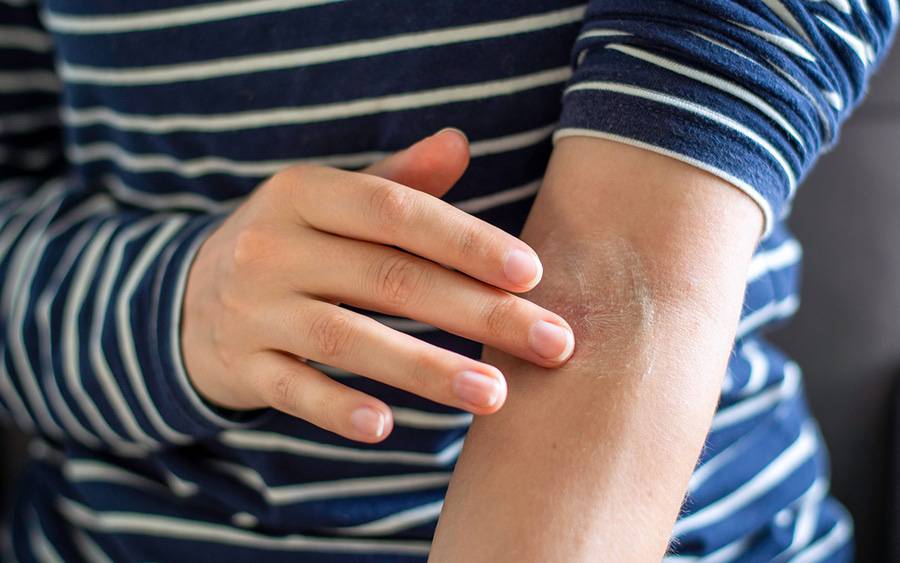What Causes Dry White Patches on Skin?
Common causes and treatments for white spots on skin

Common causes and treatments for white spots on skin
White spots on the skin can be caused by a variety of conditions, including allergies and nutritional deficiencies.
“Generally, a white patch on your skin isn’t a cause for concern,” says Cynthia Wilson, DO, a family medicine physician at Scripps Coastal Medical Center Carlsbad.
If you have questions or concerns talk to your primary care provider. “Skin discoloration can be triggered by a variety of causes, so check with your doctor for a diagnosis and treatment options.”
What causes white dry patches on skin?
The most common causes of dry white patches on the skin are eczema, seborrheic dermatitis, psoriasis and nutritional deficiencies.
Eczema
Eczema
Eczema is a chronic, probably genetic, inflammatory skin condition that causes the skin to become inflamed or irritated and often results in a patch of skin that is lighter in pigment than the skin around it. It is the most common chronic inflammatory skin disease, according to the National Institute of Allergy and Infectious Diseases.
“Eczema is especially common in children,” says Dr. Wilson. “They often outgrow it, but some people continue to have symptoms on and off throughout their lives.”
Eczema is always itchy, and sometimes itching will start before a rash appears, most often on the face, back of knees, wrists, hands or feet. The areas may appear dry, thickened or scaly, and sometimes the skin can blister.
Eczema can make people more susceptible to bacterial, viral and fungal skin infections. It is also the strongest risk factor for the development of food allergy.
Treatment for eczema focuses on relieving and preventing itching, since scratching can make it worse and even lead to infection. Lotions and creams can keep the skin moist, and cold compresses can provide relief from itching. Other treatments include phototherapy, antihistamines and hydrocortisone.
“The right treatment will depend on your age, medical history and severity of your symptoms,” says Dr. Wilson. “Your doctor can determine what is best for you.”
Seborrheic dermatitis
Seborrheic dermatitis
Often called cradle cap in babies and dandruff in adults, seborrheic dermatitis causes itchy, red skin on the scalp, face and chest. In adults, dermatitis can be a chronic condition caused by stress, fungus or other issues.
Symptoms can be managed with creams, medicated shampoos, antifungal agents and other treatments. You may need to try different products or a combination of products before the condition improves.
Psoriasis
Psoriasis
Psoriasis is a common chronic skin disorder in which white blood cells cause inflammation. Skin cells multiply too rapidly, building up on the surface of the skin and causing a scaly, itchy plaque. There are different types of psoriasis.
“Factors that trigger psoriasis include skin scrapes and bug bites, stress, smoking, alcohol and even vitamin D deficiency,” says Dr. Wilson. “If you and your doctor can identify your triggers, lifestyle changes can help you avoid the condition.”
Treatments include topical creams and ointments, light therapy and systemic medications for severe psoriasis.
People with psoriasis may also experience other health conditions, including psoriatic arthritis.
Nutritional deficiencies
Deficiencies in calcium, vitamin D and vitamin E can cause white patches on the skin. While harmless, these white spots indicate that you need to eat a healthy, balanced diet.